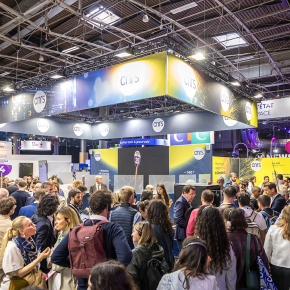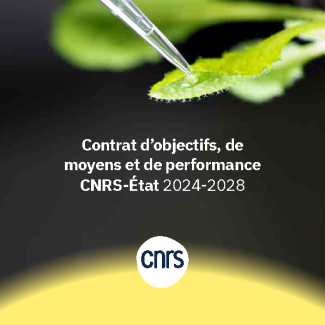
Addressing the challenges of a society in transition: the CNRS at VivaTech!
• Its stand will be a space for dialogue between basic research and the business world, with extensive programming featuring essential figures from both fields as part of three thematic days dedicated to digital technology, the environment, and health. • The research organisation will present a selection of start-ups that emerged from laboratories under CNRS supervisory authority, and that are using their innovation to address major societal challenges in the fields of quantum technology, energy, sustainable development, and health. |
The CNRS, an essential international research and innovation actor, is participating for the sixth time in VivaTech, Europe’s largest trade fair devoted entirely to innovation.
From 11-14 June 2025, the organisation will showcase the vital dialogue between basic research and the business world as they both face the challenges of the future, namely by exploring crucial issues in health, the environment, and digital technology. Organised into three thematic days, the extensive programming will include round-tables and inspiring presentations from experts, business partners, and representatives from start-ups that emerged from laboratories under the organisation’s supervisory authority.
The CNRS conducts basic research in the service of society. An essential actor in economic development, it partners with enterprises seeking to bring forth the innovation of the future. For this 2025 edition, the research organisation invited both professionals and the general public to explore issues and expectations surrounding innovation in health, the environment, and digital technology. At our stand you can meet experts and actors from the business world who are mobilising to address the major challenges of the future.
Extensive programming divided across three thematic days
Each day will feature expert speakers presenting the perspectives of science and business, including presentations, round-tables, and start-up pitch sessions. Mini-conferences focusing on these major challenges of the future will be offered every afternoon.
Wednesday 11 June – Digital Day: this first day will be devoted to the technological challenges represented by cybersecurity, the quantum technology revolution, and generative AI for the sciences.
Speakers include: Jean-Yves Marion, Director of the Lorraine Research Laboratory in Computer Science and its Applications (CNRS/National Institute for Research in Digital Science and Technology/Université de Lorraine), co-founder of the start-up Cyber-Detect, and the Academic Manager of the CyberMallix associated research laboratory (CNRS/Université de Lorraine/National Institute for Research in Digital Science and Technology/société WALLIX).
Thursday 12 June – Environment Day: the topic of alternatives to PFASs will be explored in the morning, followed by a round-table on the challenge of adapting to climate change. Two conferences will follow, specifically on the challenges relating to the materials of the future and on-going societal transitions.
Speakers include: Frédéric Leroux, CNRS chemist, Director of the Department of Molecular Chemistry at the Laboratory for Molecular Innovation and Applications (CNRS/University of Strasbourg/Université de Haute-Alsace).
Friday 13 June – Health Day: this final day of programming will examine challenges in health, and will propose two mini-conferences on research challenges relating to the brain and life in the Universe.
Speakers include: Anne-Marie Gué, CNRS Senior Researcher, Scientific Deputy Director for Interdisciplinarity at CNRS Engineering, and Co-Director of the Organs and Organoids on Chips PEPR.
From basic research to the market: meeting the start-ups that emerged from laboratories under CNRS supervisory authority
As a complement to the three topics featured for the 2025 edition, the CNRS selected high potential start-ups developing groundbreaking technologies in research areas that now more than ever address societal and technological challenges:
Quantum computing will be central to future cutting-edge technologies. This year the CNRS is featuring the start-up Pasqal, co-founded by Alain Aspect (2022 Nobel Prize for Physics and CNRS Senior Researcher Emeritus) and Antoine Browaeys (CNRS Senior Researcher and 2021 CNRS Silver Medal Winner). This enterprise will present its quantum processor based on neutral atom technology that can perform calculations impossible for classical computers to solve. The start-up CryptoNext will present its solutions for post-quantum encryption addressing computer insecurity issues.
In sustainable development, the enterprise Vulkam will exhibit its Vulkalloys. Thanks to their precision and durability, these amorphous metals have applications in cutting-edge micromechanics such as watchmaking, medicine, or the space industry. The start-up Verley (ex-Bon Vivant) will present its innovation for sustainable food based on precision fermentation techniques. These proteins can be used to produce dairy product substitutes that are friendly toward animals and the planet, all while having taste.
The field of energy is also a major issue for the planet. The compagny Geolinks will present its underground monitoring solutions based on ambient noise to warn of seismic risks or to detect potential deposits of resources such as hydrogen. This latter resource is central to the start-up H2Sys, which is developing portable, hydrogen-powered electric generators for large-scale and low-carbon production.
Finally, in health the focus will be on the start-up MovaLife and its robotic solution designed to optimise in vitro fertilisation (IVF). This technology uses microbots coupled to optical tweezers in order to significantly improve IVF success rates (which currently vary between 13-46%). Okomera will present TechBio, its platform for developing cancer treatments. It has already made possible significant progress thanks to the generation of functional organoids using AI-driven microfluidic screening.
For further information on the CNRS at VivaTech: The CNRS at VivaTech 2025.
Innovation at the CNRS involves:
|


